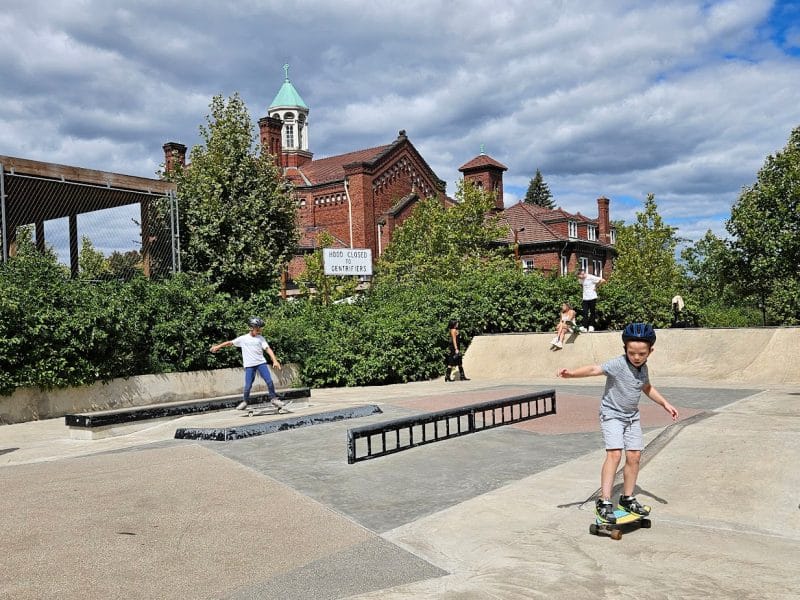Motor City Brewmasters
Detroit’s golden age of brewing was long ago, but today’s brewmasters are seeking to recapture some of the city’s beer-making legacy.
A line of wooden boxes mounted on the wall at Atwater Block Brewery in Rivertown displays old beer bottles with their labels: Pfeiffer, Goebel, Zynda, Schmidt, Tivoli, Auto City Brewing Co., and of course, The Stroh Brewing Co. All huge Detroit breweries; all gone.
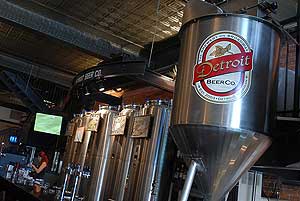 Detroit was once a center for beer production, with a half dozen breweries producing more than any single brewery in Michigan now.
Detroit was once a center for beer production, with a half dozen breweries producing more than any single brewery in Michigan now.
While Detroit’s brewing prowess is nowhere near where it once was, the ones that are here are consistently considered among the best in the nation, winning national medals for quality.
Atwater owner Mark Rieth wants Detroiters to take notice, and wants to reclaim some of the city’s former brewing glory. He intends for Atwater to be Detroit’s beer, found in every bar in the city, peddled at festivals in Hart Plaza and sold by vendors at Comerica Park.
When Rieth bought the brewery in 2005, he immediately changed the name from Stoney Creek Brewing Co. back to Atwater Block Brewery to recapture the name of a former German brewery that was once directly across the street from the existing location on Jos. Campau Avenue on the East Riverfront.
“It was my goal to bring it back as Atwater because everybody realizes Atwater as the being the brewery of Detroit,” Rieth says.
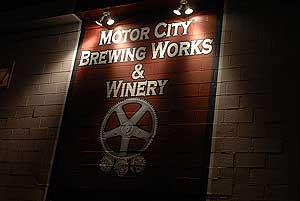 The Detroit Historical Society is also looking to capitalize on Detroit’s brewing past, and attract a few younger members to the group. The society is holding a beer-tasting event at the newly updated and re-opened Detroit Historical Museum on Oct. 20. It’s also sponsoring a “Hiistory of Beermaking in Detroit” lecture on Oct. 15 at the museum.
The Detroit Historical Society is also looking to capitalize on Detroit’s brewing past, and attract a few younger members to the group. The society is holding a beer-tasting event at the newly updated and re-opened Detroit Historical Museum on Oct. 20. It’s also sponsoring a “Hiistory of Beermaking in Detroit” lecture on Oct. 15 at the museum.
“We try to find historical angles in all of the events and programs that we do,” says Bob Sadler, director of public relations for the society. “The fact that there was a history of beer and brewing in Detroit made it a desirable event for us because there was a story that could be told.”
Brew history
The first record of beermaking in Detroit is an article in an 1829 Cleveland Herald newspaper that noted a shipment of beer had arrived, according to Brewed in Detroit, a thorough history book authored by a former Stroh‘s brewer, Peter H. Blum.
The Farmer’s Brewery of Owen & Scott was advertising porter beer and table ale in 1831, and by 1837 the city directory listed the City Brewery at Congress and First and the Emerson Davis & Aaron Moore brewery on Woodbridge.
By 1861 there were close to 40 breweries in Detroit, about three dozen more than currently operate in the city limits. The biggest included John Carew’s Detroit Brewery on First, W.C. Duncan’s Central Brewery, George Carne’s on Atwater and the Western Brewery of Rufus Brown at Abbott and Seventh.
Most of these were small brewers making ales. Ale, with a short aging time, darker color and rich taste that hid imperfections, was suited for the rough conditions in frontier towns and was the preferred English brew. Most small microbreweries today make ale, not lager. Ale = Bell‘s Oberon. Lager = Stroh‘s.
Bernhard Stroh hit town in 1848, marking the beginning of German-influenced beers, mostly lagers. Stroh’s lasted until 1985 and for much of the 20th century was the most dominant brewery in Detroit. Germans disdained the ales because the lagers were more difficult to make, requiring more aging and more precision. Lager means storage or aging in German. (Atwater Block Brewery makes lagers using German brewing equipment.)
The golden age of brewing in Detroit was between 1890 and 1910. Names like Pfeiffer, Goebel and Zynda – a major Polish brewer — pushed onto the scene. It was also the beginning of consolidation and pasteurization. Big brewery owners realized the only way to compete was to produce large volumes.
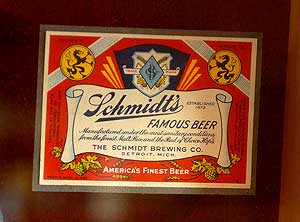 As you might imagine, Prohibition had a disastrous effect on breweries. Some breweries never reopened, but for those that did, business boomed following the repeal. Stroh’s, Pfeiffer, Schmidt and Goebel all were selling several hundred thousand barrels of beer annually – nearly 10 times as much as Bell‘s brewery in Kalamazoo, now Michigan‘s largest brewer.
As you might imagine, Prohibition had a disastrous effect on breweries. Some breweries never reopened, but for those that did, business boomed following the repeal. Stroh’s, Pfeiffer, Schmidt and Goebel all were selling several hundred thousand barrels of beer annually – nearly 10 times as much as Bell‘s brewery in Kalamazoo, now Michigan‘s largest brewer.
A strike in 1958 nearly put all of the brewers out of business. Pfeiffer went down; Goebel and Schmidt fell a few years later. The strike allowed other national brands, like Budweiser, to begin making inroads in the Detroit market. Stroh cruised and reached six million barrels by 1977 and was a major national player. But that was its zenith.
Stroh and all the other breweries that were dominant in Detroit closed or were sold off to other major breweries and all of the facilities in Detroit were closed with Stroh’s Detroit brewery shutting down in 1985. It’s now owned by Pabst Brewing Co.
Return of the little guys
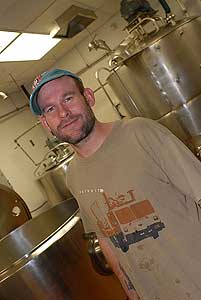 Six years after Stroh’s Detroit brewery closed, the first microbrewery in Detroit opened across the street from Traffic Jam & Snug restaurant on West Canfield in Midtown. The Detroit Mackinac brewery was built to supply craft-brewed beer to the restaurant, because at the time it was illegal to brew beer on site.
Six years after Stroh’s Detroit brewery closed, the first microbrewery in Detroit opened across the street from Traffic Jam & Snug restaurant on West Canfield in Midtown. The Detroit Mackinac brewery was built to supply craft-brewed beer to the restaurant, because at the time it was illegal to brew beer on site.
Eventually, Traffic Jam got the first brewpub license in the state and now brews its own in-house. A brewpub makes beer that can only be served on site or sold from the pub, not in other stores. In fact, Chris Reilly, Traffic Jam‘s brewmaster, says a state legislator who was a customer introduced the legislation to allow brewpubs, and now there two dozen around the state, including the Detroit Beer Co. on Broadway.
The former Traffic Jam brewery became Motor City Brewing Works, makers of Ghetto Blaster and Motown Lager. (The brewery also has a “taproom” bar open to the public.)
Rieth says he knows he has a long way to go before Atwater really becomes “Deroit’s beer.” The closest thing to a local beer on most taps in this town is a token Bell’s Oberon – the most popular style from Kalamazoo.
But there is opportunity for beer to make a big comeback in the city. Rieth, a 39-year-old who graduated from Michigan State University with a degree in business and a love for beer, says he is very aware of the history of beer-making here. He intends to restart one of the historic labels of the now defunct breweries, attempting to match the style of the original. Next year he also plans to start brewing beer on contract for another microbrewery, using more of his brewing capacity.
“All I am concerned about is the legacy, bringing back the heritage of Detroit‘s breweries,” Rieth says. And who wouldn’t drink to that?
The Detroit Historical Society’s Taste of the D beer-tasting fundraiser is Friday, Oct. 20 from 7 p.m.-midnight at the Detroit Historical Museum
(5401 Woodward Ave at Kirby) in Midtown. The event features beer, music, a trivia contest, and snack food. Cost is $15 for Detroit Historical Society members, $20 for non-members in advance, and $25 at the door for everyone 21 and over. For tickets, call (313) 833-1980 or visit www.detroithistorical.com/thingstodo.
Photos:
Taps at Atwater Block Brewery
Detroit Beer Co.
Motor City Brewing Works
Schmidt’s Beer Label at Atwater Brewery
Chris Reilly, Traffic Jam’s Brewmaster
All Photographs Copyright Dave Krieger


